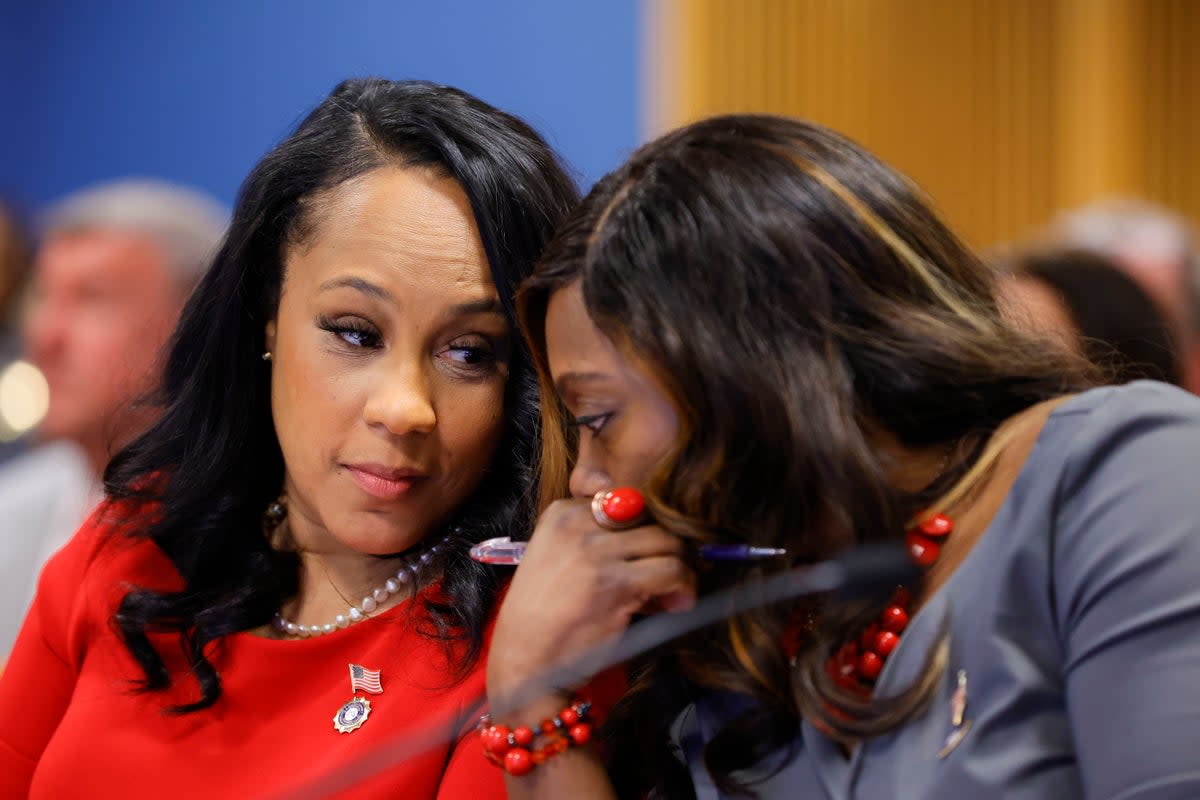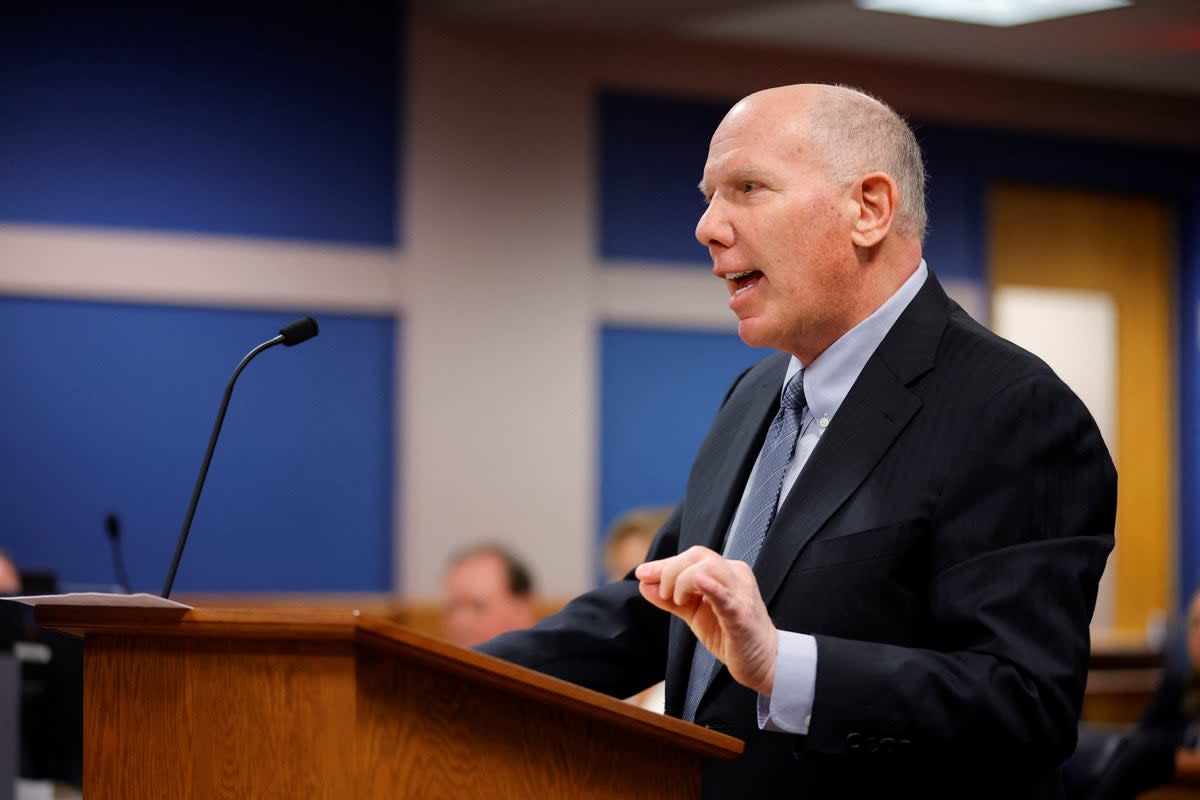Trump lawyers accused of using ‘speculation, gossip and innuendo’ to attack Fani Willis in high-stakes hearing
Lawyers for Donald Trump and his co-defendants in a sprawling election interference case in Georgia have been accused of relying on salacious rumours, gossip and innuendo to “embarass and harass” the prosecutor overseeing the case against them.
Closing arguments concluded on Friday in a high-stakes series of hearings to determine whether Fani Willis should be disqualified from criminally prosecuting the former president and his allies for their scheme to overturn Georgia’s election results in 2020.
That decision hinges on allegations that the Fulton County district attorney financially benefited from a prior relationship with a prosecutor she hired to lead the case against the former president.
Lawyers for the former president and his co-defendants claim that Ms Willis improperly benefited from her romantic relationship with Nathan Wade when she hired him on the case and then had him pay for vacations they took together.
Ms Willis and Mr Wade have acknowledged the relationship, but they have repeatedly testified that they started dating after he was hired, split travel costs, and that the relationship ended last summer before an indictment.
If attorneys can substantiate those allegations, and prove that the now-former couple was involved before Ms Willis hired Mr Wade, her entire office could risk disqualification, throwing the case against Mr Trump into jeopardy.
Fulton County Superior Court Judge Scott McAfee said he will have an answer within the next two weeks.

Lawyers representing the district attorney argued that the case rested on the defence’s attempts to publicly “impugn” and smear the prosecutor as political payback, and that the testimony and documents present to the court showed “no evidence that the district attorney has financially benefited at all.”
What the evidence did show is the “true cost” of being the district attorney, according to attorney Adam Abbate, who delivered closing arguments for the prosecution in Atlanta on Friday.
On top of a mortgage for a house she was forced to leave due to threats against her, she had to pay for a “safe house” by renting an apartment, while she endured racist and sexist attacks, isolation from family and friends, and “cruel statements” and “falsehoods” that were leaked to the media to undermine her and the case against Mr Trump, according to Mr Abbate.
“Why would Ms Willis repeatedly ask this court to set a trial date as soon as possible if her motive in prosecuting this case was to continue to financially gain, as alleged, from the prosecution of this case?” he said. “It doesn’t line up. It doesn’t make sense.”
In three days of hearings over the last two weeks, Judge McAfee heard intimate details of Ms Willis’s personal life – including testimony from the district attorney herself, as well as from Mr Wade and her father – while “star” witnesses for the defence failed to wring out revealing details about them.
It remains unclear whether any of that testimony convinced the judge that the relationship presented a conflict of interest that should result in her office’s removal from the case.
“If this court allows this kind of behaviour … public confidence will be shot,” Mr Roman’s attorney John Merchant argued on Friday.
“We could frankly care less if they had a personal relationship outside of work. That’s not what’s at issue here,” he said.
The defendants allege that the now-former couple started dating in 2019, while testimony and sworn statements from Ms Willis and Mr Wade state that they started dating two years later, after he was hired, and then ended the relationship before the indictment.
“She awarded him a contract, where public money either from Fulton County or the state of Georgia ended up in his pockets,” Mr Merchant said. “Then he and she used that money to go on personal vacations and trips.”
He also argued earlier that the bar for a disqualifying “personal interest” is a “you know it when you see it” determination.
“I think frankly, as I was trying to figure this out, I think you know when you see it,” he said. “I think there’s good enough facts in front of you that you know when you see it. I think that governing principle helps enlighten some of the facts here.”
Steve Sadow, Mr Trump’s attorney in the case, argued that the judge could determine that Ms Willis and Mr Wade lied on the stand, and that Terrence Bradley – Mr Wade’s former law partner – spoke “clear-cut lies” when he “did everything he possibly could do to evade answering questions” about their relationship timeline.

Mr Trump is charged alongside more than a dozen co-defendants – including former White House chief of staff Mark Meadows and former attorney Rudy Giuliani – as part of an alleged “criminal enterprise” to overturn the state’s 2020 presidential election results, from using a so-called “fake elector” scheme to falsely assert his victory in the state and pressuring election workers and state officials, to seizing vote information from machines in another county in the state.
Four of his original co-defendants in the Fulton County case – including Trump-allied attorneys Kenneth Chesebro, Jenna Ellis and Sidney Powell – reached plea deals with prosecutors.
Harry MacDougal, attorney for former Justice Department official Jeffrey Clark, argued on Friday that the district attorney’s “did nothing to correct obviously perjured testimony” from Ms Willis and Mr Wade.
“The reason they lied and covered it up is to avoid the situation they’re in right now,” he said.
He also argued that the actions of the Ms Willis’s office during these hearings have been disqualifying, continuing a pattern of “concealment and coverup”.
“Now they’ve enlisted the entire office in the enterprise,” he said.
“Prosecutors don’t act like this. Lawyers don’t act like this,” defence attorney Craig Gillen told the judge. “These people need to go.”
Mr Abbate, the only lawyer for the district attorney’s office to present a closing statement, pressed the judge to reject the defence motions to disqualify Ms Willis and toss out the case, arguing that attorneys for Mr Trump and his co-defendants failed to meet the standards for disqualifying and that the prosecution was politically motivated.
He argued that if Ms Willis really wanted to appear politically biased, she would have indicted all 39 people that the grand jury reccomended for prosecution, rather than 19.
“The public prosecutor is necessarily a partisan in the case,” he argued.
If prosecutors were held to the same impartial standards as judges, “then there would never be a criminal prosecution because the state is always going to appear biased,” he said.
After three hours of arguments, Judge McAfee gave no indication how we would make a decision on the matter.
“There are several legal issues to sort through, several factual determinations that I have to make,” he said. “And those aren’t ones that I can make at this moment. And so I will be taking the time to make sure that I give this case the full consideration that it’s due. I hope to have an answer for everyone within the next two weeks.”


